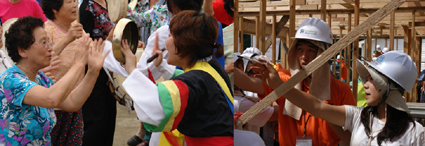
One person wearing gojengee (pants that are widely worn in the countryside) and a big weave hat reminds us of a farmer toiling hard. When 10 to 20 young people are wearing those clothes, we think of a nonghwal, the abbreviated Korean word for an organized activity where students share labor and ideas with members of the farming community.
Starting in the 1980s with the goal of enlightening and informing the farming community, nonghwal have been a typical university student activity. A nonghwal normally involves a group of students who visit a specific region during their vacation to help farmers with their daily farming activity, understand more about the farmers’ lives through in-depth conversations, and participate in community festivals. Park Hye-jin (Clothing & Textiles, 3), who participated in a nonghwal organized by the Student Group Association on June 25 said that the community festival was the most impressive activity for her since her team had prepared for it very hard, utilizing the time slots after their labor work.
However, now the number of students participating in traditional nonghwal has greatly decreased.
“It is hard for students like me, who have to stay in the laboratory and conduct experiments, to go to nonghwal. And I am already busy preparing for my graduate course,” said Cho Kyu-eun (Environmental Science and Engineering, 3). Like Cho, many university students are engaged in their own career development activities.
Huh Young-ho (Hankuk University of Foreign Studies, 3), who led 300 people at his school on a nonghwal on June 27, admits that the number of people participating in nonghwal has decreased. “Some people often say that they can’t participate for the whole eight days and ask whether they can participate for only a few days because of their part time jobs,” said Huh. “However, many people enjoy nonghwal as they gain precious memories and learn about the society,” said Huh.
Although traditional nonghwal activities have decreased in number, there have been new forms of nonghwal slowly rising. One type focuses on doing volunteer work directly related to the students’ major.
Noh Seo-young (
The Student Council of the Ewha Pharmacy department has been supplying medicines to farmers for more than 10 years. This year, they went to Ye San in Chungchung province. During the seven days of the program, they helped the farmers with cultivating tomatoes and watermelons. On the last day, with the help of a doctor, the students supplied basic medicine to the people of the village.
“We asked pharmaceutical companies to sponsor us with some medicine and they gladly agreed,” said Ryu Jung-min (Pharmacy, 3), the vice president of the Pharmacy department. Ryu added that, by experiencing the hard work of the farmers, she found out which parts of the body ached the most and came to understand why muscle and skeleton diseases are commonly seen in farmers. “I will be a pharmacist someday and through this experience, I got to know more about the people I should care for and cure,” said Ryu.
Teaching is another “neo” nonghwal activity widely done by university students. Teaching Korean to foreign migrant workers and foreign brides in rural areas has been a great pleasure for Kim Hye-jin (’06, Hankuk University of Foreign Studies). Starting in 2003, Kim taught many foreign migrant workers from
Hot summer vacation is over and students come back to school with many stories and memories to share. “When many people ask me why I want to go on a nonghwal, I say, you may see the farmers’ hardships on TV but you can never understand it unless you really feel it,” said Park. “You go to places to volunteer and help the people there, but actually you are the one who is receiving the help as you get to learn more from them.”

